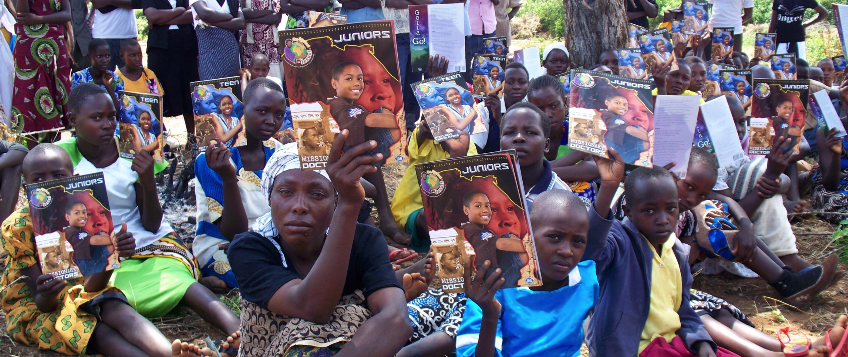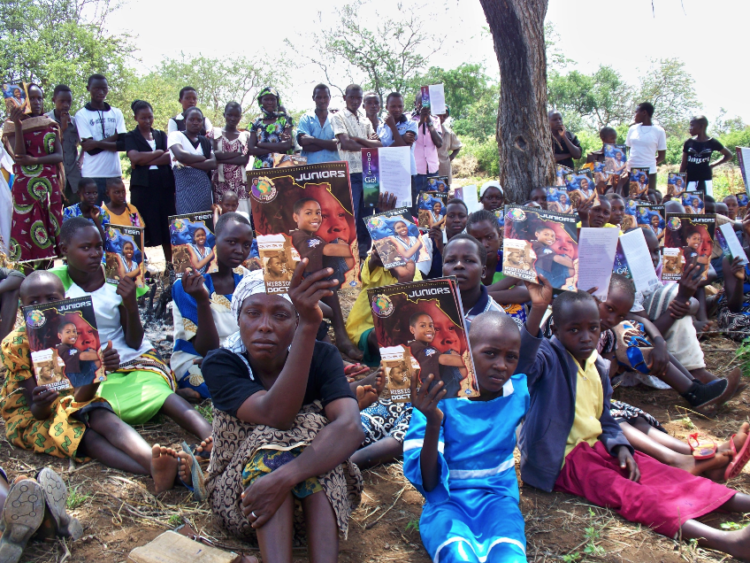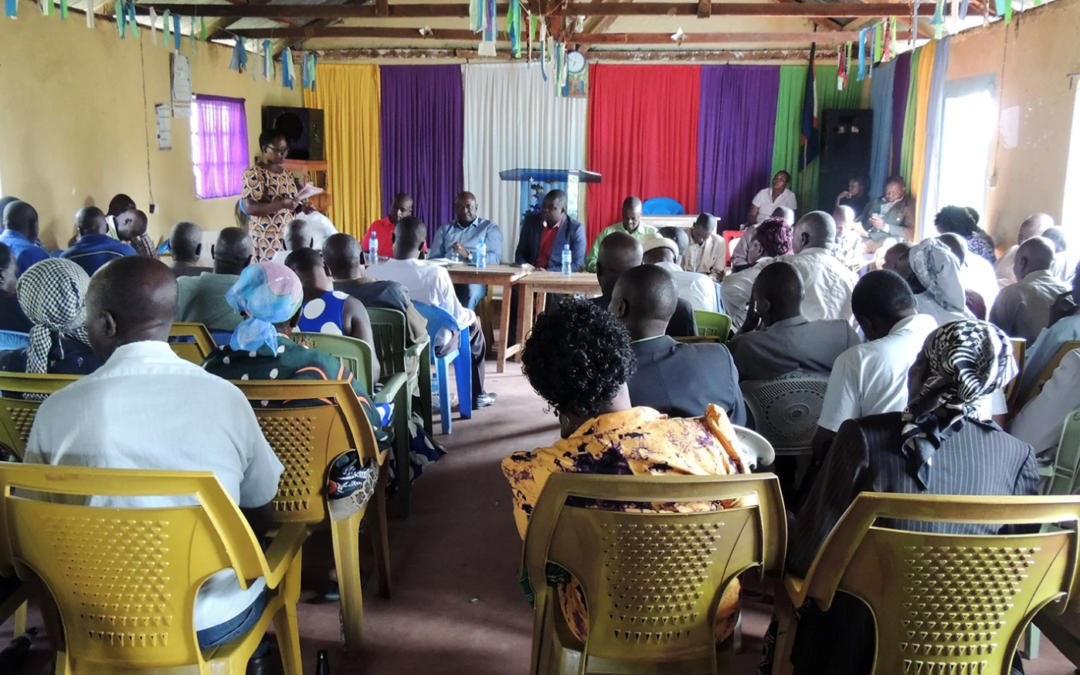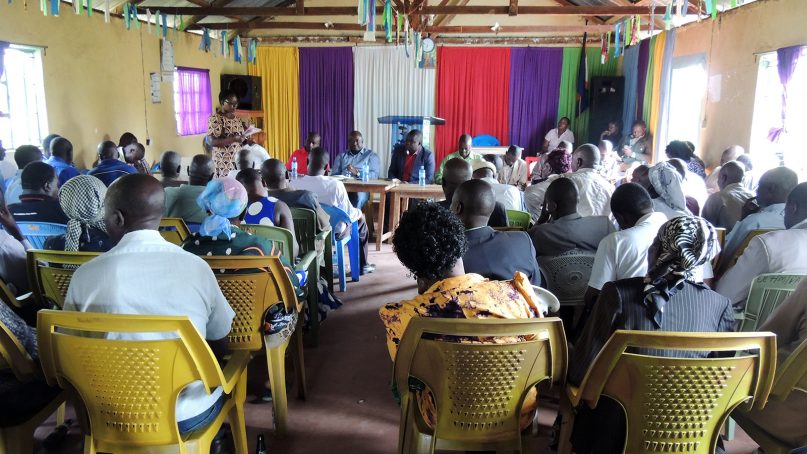
Love Packages

Believers in Kenya having a church meeting underneath a tree using materials from Urban Ministries, Inc.
How many of us have an old Bible on a bookshelf, a stack of old curriculum stashed in a closet, or several years of commentaries stored away in a desk? Did you know that in Africa and other parts of the world, some people are willing to walk miles just to get even one of those older pieces of Biblical literature?
Love Packages, a nondenominational nonprofit, takes on the arduous task of sending more than 1,500 tons of donated curriculum each year from churches and individuals nationwide to people all over the world who desperately seek them. They’ve got two warehouses – one in Decatur, Alabama, and one in Butler, Illinois. At various collection points around each state, people bring their used Biblical literature in any way they can – in horse trailers, cars, vans, trucks, and tractor trailers. Nine major publishing houses, including Urban Ministries, Inc., also make donations. Once the materials reach the Love Packages warehouses, more than 1,000 volunteers go through it and sort it into six categories: Bibles, reference materials, Sunday School literature, books, magazines, and daily devotionals (music/tracts/miscellaneous). Then, in the host countries, the materials are delivered in ocean-shipping containers to distribution points where various ministries, such as Every Home for Christ Assemblies of God or Evangelical Fellowship, distribute it.
Video Courtesy of Love Packages
The organization’s website is filled with testimonials from all over the world. One from South Africa this past February reads: “We had meetings last week at New Stock Road. After the preaching at the campaign, 46 people gave their lives to Jesus and we gave them the Christian material that we got from you, and also the little booklet of John and Romans, it was a great time of joy. Love in Jesus Name.”
Steve Schmidt, the founder of Love Packages, shared an experience he had on a visit to Zambia in 1999. It started when he read an article about the first elected president Frederick Chiluba, who was explaining that he was a born again Christian and he wanted to do everything in his power to bring the principles, precepts and powers of God to bear on his country. However, he didn’t have any literature. He wrote a letter to President Chiluba explaining his organization and he was invited to visit the country to help them out. When he met with a Bishop who oversaw 700 churches, he learned that most of the pastors didn’t have a Bible and none had Sunday School materials.
“That was in ‘99. We’ve improved that some. We’ve sent about 400 tons of literature into Zambia and we’ve been shipping into Zimbabwe now too,” said Schmidt, who said in general they ship 20 to 40 tons of literature every week. The 20-ton containers they use cost between $3,500 to $9,000. “Every 20-ton container has at least a half a million pieces of literature in it.”

A distribution center overseas receives commentaries from Urban Ministries, Inc.
Schmidt started Love Packages in the summer of 1975. He had four-year-old old Bibles and initially thought he’d use it to prepare lessons. But God had other plans.
“I argued with the Lord for about three months. Told him I was going to use it to prepare lessons. He said, ‘No, you’re not,’” said Schmidt, who questioned, “Who am I going to give an old Bible to? I don’t know anybody who wants it.”
But then he thought of some men who had just graduated from a Bible college and were going home to their home countries in Ghana, Nigeria, India, and various other countries. He wrote them a letter, asking if they had any need for old Biblical literature.
“I didn’t know there was a great need,” Schmidt said. “I didn’t know anything! But the letters seemed like they were only gone a couple of days and they were back, and said, ‘Yes, we can use as much as we can get here, as soon as you can get it here.’”
Schmidt and his wife started in the basement of their home and in the first year sent 60 little boxes overseas from August to January. As he went to various small church events held in his community, from the Baptist chicken dinner to the Methodist Pancake breakfast, the donations started to pour in. By the second year, people began dropping off boxes on their front and back porches and their living room was full of boxes.
“It grew that second year to three and a half tons. And then, the next year, seven tons, and eleven tons… And our goal for 2020 is to ship 2,020 tons!” said Schmidt. “Even with COVID-19, we’re still at 660 tons of literature that we shipped this year so far. And that’s just the literature that’s being used in different places. We’ll send enough literature this year for about somewhere between 60 and 80 million people to read.”
Between the two states in Alabama and Illinois, Love Packages maintains three full-time staff members in each state and is supported entirely by donations from churches and individuals. Youth groups or men/women ministries going on short-term mission trips, and even families in Illinois at the Butler warehouse are able to come and stay in two dormitories, one with 25-30 rooms and the other 10-15 rooms. Groups can stay for up to a week.
“You can eat dinner with us. There’s probably a hundred or so stories. We have a chalkboard and there are stories about different testimonies that happened and people who got saved or healed or got a book for the first time or etc. And we tell stories during the lunchtime and try to encourage people to think eternally and pursue God with all their hearts,” said Schmidt.


